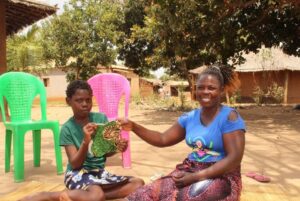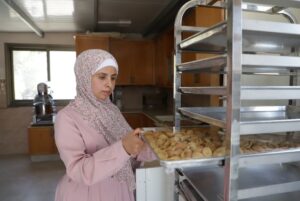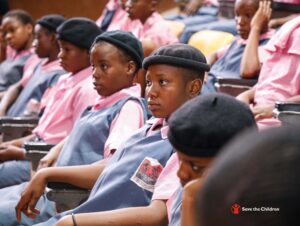Time to #BreakTheBias: A reflection on International Women’s Day
Every year on the 8th of March, the global community celebrates the social, economic, cultural and political achievements of women. The moment originally emerged from women organizing in the labour movements in the early 1900s. Now, it has morphed to become an international movement celebrated throughout the entire month of March.
This year the theme for International Women’s Day (IWD) was ‘breaking the bias’ – with a goal towards creating a world that is gender equal and free of bias, stereotypes and discrimination.
Gender equality is a fundamental part of Save the Children’s programming in Canada and throughout the world. Our work focuses on preventing and responding to various forms of gender-based violence, including child and early forced marriage (CEFM).
Learn more about some of our programs funded by Global Affairs Canada and our supporters, which strive to change social norms that create gender inequality and power imbalances for young women, girls and children of different gender expressions.
The Ungumi project
The aim of this project is to improve sexual and reproductive health and rights for rural adolescent girls and boys in and out of school, across 43 communities and schools in three districts in Mozambique.
Through access to gender-sensitive and age-appropriate sexual health information, youth ages 10-19 gain a better understanding of their own sexual and reproductive health.

Catarina and her daughter learned how to make reusable menstrual pads through the Ungumi project’s workshops. “Now I only use the pads that I sew myself. When my daughter had her first period, I taught her how to sew the pads by hand.” The impact of the trainings has been shared and passed to many other girls within the communities and empowers them to feel confident while they are menstruating that they can continue to go to school and take part in community activities.
The She Succeeds: Women and Youth Empowerment, Entrepreneurship and Employment project in the West Bank and Gaza
Youth unemployment in Palestine is among the highest in the region at 40%, but in Gaza the problem is particularly challenging, where youth unemployment is more than 60%. Young women ages 16-29 face more challenges around gaining employment. The She Succeeds project enhances economic empowerment for these young women, particularly in the West Bank area and across the whole of Gaza.
Through addressing the gender-based barriers, the project works with young girls to develop small- and medium-sized entrepreneurship opportunities within the agriculture sector.

Twenty-one-year-old Abeer excelled in school, but due to financial challenges was unable to complete university. Through She Succeeds Abeer received entrepreneurial training, where she learned marketing and business management skills. With her new skill set and funding from the project she was able to launch her own sweets and pastry business. She also gained a level of confidence. “….I used to be shy since I never went to university, and through these trainings, my personality became stronger, especially when dealing with different customers and suppliers,” Abeer explains. Her speciality sweets have been in demand in various neighbourhoods, which has allowed her to expand her business.
The Girls’ Education in Conflict-affected Areas project in Northeast Nigeria
The Girls’ Education in Conflict-affected Areas project implemented in 60 schools in northeast Nigeria supports crisis-affected girls, ages 6-14. These young girls are often out of school, making them more vulnerable to sexual abuse and child early and forced marriage.
Harmful beliefs and behaviors that hinder gender equality are combatted through engagement with young girls, their male peers, caregivers, various levels of the community and local and national authorities. By focusing on promoting gender equality and positive gender norms at the individual, household, community and state level, a noticeable shift in norms is more realistic.
This year around International Women’s Day, an event took place in Nigeria including young girls from the program, community leaders, elected officials, and media highlighting gender equality and the environment. Well-educated and empowered girls can result in better-trained leaders contributing to stronger climate strategies for the future.

IWD is a moment to celebrate, while also a time to remember that there is still work to be done to achieve gender equality locally, nationally, and globally.
Girls and young women everywhere have the right to the same opportunities as boys and young men, and as an organization, we will continue to strive towards this, not only in March, but throughout the year.


